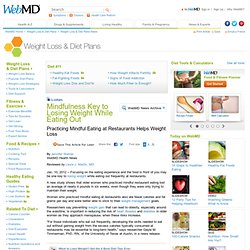

Changing the Way You Relate to Food. Make time to buy & prepare healthy foods Weight loss is a $40 billion dollar a year industry. Advertisers lure us with images of a healthy and happy life spent running along the beach with the sun shining overhead, then heading home to eat our grapefruit and take our diet supplement. Unfortunately, the reality of long-term weight loss is a lot more complex and involves learning a new set of life skills.
In 2007-8, 34% of the US adult population was overweight and 34% was obese, according to figures from the Centers for Disease Control. Being overweight, especially having excess abdominal fat and insulin resistance, the so called "metabolic syndrome," conveys increased risk for Type II diabetes, high blood pressure, and heart attack or stroke. Dieting Alone Doesn't Work Research studies suggest that dieting alone doesn't work for long-term weight loss. Sports Are 80 Percent Mental: Just Pretend Those Carrots Are Cheese Fries. Your Fork Is Why You're Fat. Study offers clues to emotional eating. The study drives home just how difficult it can be to eat healthy and resist so-called emotional eating in a stressful world.
Does food 'addiction' explain explosion of obesity? By Nanci Hellmich, USA TODAY Obesity has long been blamed on weak willpower, overeating, genetics and lack of exercise.
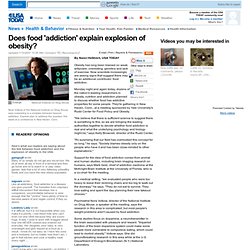
Evidence for 'food addiction' in humans. Research to be presented at the upcoming annual meeting of the Society for the Study of Ingestive Behavior (SSIB), the foremost society for research into all aspects of eating and drinking behavior, suggests that people can become dependent on highly palatable foods and engage in a compulsive pattern of consumption, similar to the behaviors we observe in drug addicts and those with alcoholism.
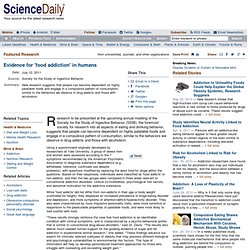
Using a questionnaire originally developed by researchers at Yale University, a group of obese men and women were assessed according to the 7 symptoms recommended by the American Psychiatric Association to diagnose substance dependence (e.g., withdrawal, tolerance, continued use despite problems), with questions modified by replacing the word food for drugs within the questions. Overeating, Like Drug Use, Rewards And Alters Brain. Hide captionOur brains have chemical pathways that make us feel good when we eat, and really good when we eat sweet or fatty foods with high calories.
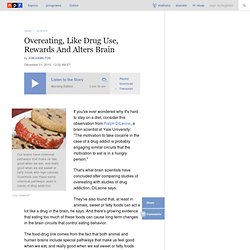
Scientists see these same chemical pathways used in cases of drug addiction. Larry Crowe/AP If you've ever wondered why it's hard to stay on a diet, consider this observation from Ralph DiLeone, a brain scientist at Yale University: "The motivation to take cocaine in the case of a drug addict is probably engaging similar circuits that the motivation to eat is in a hungry person. " Fatty Foods Addictive Like Cocaine in Growing Body of Scientific Research. Cupcakes may be addictive, just like cocaine.
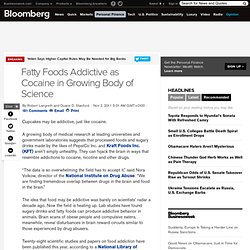
A growing body of medical research at leading universities and government laboratories suggests that processed foods and sugary drinks made by the likes of PepsiCo Inc. and Kraft Foods Inc. (KFT) aren’t simply unhealthy. They can hijack the brain in ways that resemble addictions to cocaine, nicotine and other drugs. “The data is so overwhelming the field has to accept it,” said Nora Volkow, director of the National Institute on Drug Abuse. “We are finding tremendous overlap between drugs in the brain and food in the brain.” The idea that food may be addictive was barely on scientists’ radar a decade ago. Twenty-eight scientific studies and papers on food addiction have been published this year, according to a National Library of Medicine database. Why We Crave. The term "craving" hardly does justice to that four-alarm fire raging in your brain .
Must....have....warm brownie still gooey in the middle. Must....eat.... entire container of Super Fudge Chunk. Can't...stop...scarfing down chocolate kisses. The Eating Compulsion: Refined Food Addiction. By Cassie Smith Oct 04, 2012.
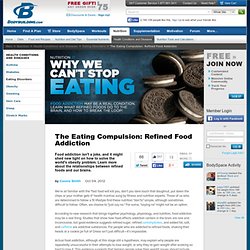
Why we love chips: The natural cannabis-like chemicals that drive our lust for junk food. By Daily Mail Reporter Updated: 14:13 GMT, 5 July 2011.

HOW DIET CAN AFFECT MOOD AND BEHAVIOR. CAMBRIDGE, Mass.
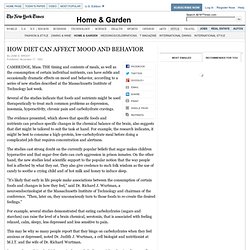
THE timing and contents of meals, as well as the consumption of certain individual nutrients, can have subtle and occasionally dramatic effects on mood and behavior, according to a series of new studies described at the Massachusetts Institute of Technology last week. Several of the studies indicate that foods and nutrients might be used therapeutically to treat such common problems as depression, insomnia, hyperactivity, chronic pain and carbohydrate cravings. The evidence presented, which shows that specific foods and nutrients can produce specific changes in the chemical balance of the brain, also suggests that diet might be tailored to suit the task at hand. For example, the research indicates, it might be best to consume a high-protein, low-carbohydrate meal before doing a complicated job that requires concentration and alertness.
Psychotherapy offers obesity prevention for 'at risk' teenage girls. A team of scientists at the Uniformed Services University of the Health Sciences and the National Institutes of Health has piloted psychotherapy treatment to prevent excessive weight gain in teenager girls deemed 'at risk' for obesity.
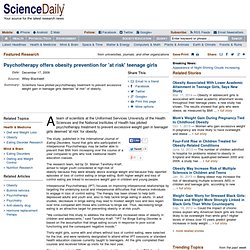
The study, published in the International Journal of Eating Disorders, found that girls who participated in Interpersonal Psychotherapy may be better able to prevent their BMI from increasing over the course of a year compared to girls who took traditional health education classes. The research team, led by Dr. Marian Tanofsky-Kraff, aimed to target youth considered at high-risk of obesity because they were already above average weight and because they reported episodes of loss of control eating or binge eating.
Mindfulness Key to Losing Weight While Eating Out. Practicing Mindful Eating at Restaurants Helps Weight Loss.
